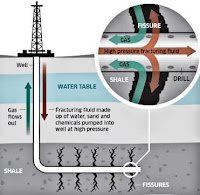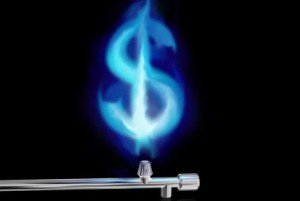What the Frack? Wackos Freaking Over Fracking
Environmentalists have in common a fear of anything that can provide the energy to drive your car, heat or cool your home or apartment, power communications technologies, and the endless other uses that we all take for granted.
By Alan Caruba
Among the many things that people who identify themselves as environmentalists have in common is a fear of  anything that can provide the energy to drive your car, heat or cool your home or apartment, power communications technologies, and the endless other uses that we all take for granted. Say oil, coal or natural gas to these people and they begin a litany of nonsense about how they are destroying the environment or pose a heath hazard.
anything that can provide the energy to drive your car, heat or cool your home or apartment, power communications technologies, and the endless other uses that we all take for granted. Say oil, coal or natural gas to these people and they begin a litany of nonsense about how they are destroying the environment or pose a heath hazard.
Whatever you do, don’t mention the name of any chemical because it can bring on trembling or an instant demand that it be banned from use. When I tell people that I ingest selenium, magnesium, potassium, and zinc, as well as retinoids, thiamine, riboflavin, niacin, ascorbic acid, egocalciferol and tocopherols, I fully expect the average environmentalist to drop to the floor in a faint.
These are the same people who give no thought to the hundreds of thousands of birds that are hacked to death by wind turbines or the acres of panels on solar farms that destroy the natural habitat of various species. They don’t even favor protecting our forest areas against catastrophic fires by the managed removal of dead or diseased trees and clearing out undergrowth.
What environmentalists have in common is a sense of superiority over all the people who they see as insisting on driving anywhere, flying anywhere, using plastic bags, or polluting the air at tailgate parties. They fear that carbon dioxide is going to destroy the Earth when all life on Earth depends on this gas (0.038% of the atmosphere) for all vegetation growth and on oxygen that keeps all living creatures alive.
Stoking all the fears environmentalists have are the environmental organizations that make millions off of these fools and the Environmental Protection Agency that exists to ban every beneficial chemical that actually protects people against pest-borne diseases and every form of energy that powers the technological advances the former generations could only read about in the earliest science fiction novels. Dick Tracy had a two-way radio-wristwatch. Today, everyone has a cell phone. When I was born television didn’t even exist, let alone computers.
The latest environmental battleground is fracking. The EPA is busy trying to convince everyone that this long-established technology “indicates likely impact to ground water”, but fracking takes place well below groundwater levels and is separated from them by layers of rock and sediment.
 Fracking is slang for hydraulic fracturing. It refers to the procedure of creating fractures in rocks and rock formations by injecting fluid into cracks to force them further open. The larger fissures allow more oil and gas to flow out of the formation and into the well from where it can be extracted
Fracking is slang for hydraulic fracturing. It refers to the procedure of creating fractures in rocks and rock formations by injecting fluid into cracks to force them further open. The larger fissures allow more oil and gas to flow out of the formation and into the well from where it can be extracted
As a Wall Street Journal editorial noted in December 2011, “More than one-third of all natural gas drilling now uses fracking, and that percentage is rising.” Even the EPA says of one study, “detections in drinking water well are generally below (i.e., in compliance with) established health and safety standards.”
“Most fracking today,” the editorial noted, “occurs 10,000 feet deep or more, far below drinking water wells, which are normally less than 500 feet.”
More to the point, “Natural gas carries a smaller carbon footprint than coal or oil, and greens once endorsed it as an alternative to coal and nuclear power. But as the shale gas revolution has advanced, greens are worried that plentiful natural gas will price wind and solar even further out of the market.”
So, naturally, the EPA is conjuring up more stringent regulations to slow this advance, along with ever deeper drilling for oil that has the potential of making American energy independent within a decade or two.
The Greens are now holding rallies and assailing legislators in individual communities and in various States to get fracking banned. In New York State, the favorite public relations agency for environmental scares, Fenton Communications, got a bunch of celebrities, Yoko Ono, Sean Lennon, Lady Gaga, and actor Mark Ruffalo to support Artists Against Fracking to issue warnings that any sensible person would ignore. In North Carolina, the legislature overrode a veto by Gov. Bev Perdue (D) making gas production through fracking legal.
Fracking and accessing other sources of energy will generate, not just lower cost energy for consumers, but produce hundreds of thousands of jobs the nation needs to get out of this horrible lagging economy.
Town by town, state by state, the Greens will wage this new war on energy with the same enthusiasm and stupidity they embraced the greatest hoax of the modern era, global warming. Shun them. Defeat them. They want to keep you shivering in the dark.
© Alan Caruba, 2012
Also consider:
Fracking: An existential threat to green dogma
 The Sierra Club and other environmental pressure groups are redoubling their efforts to “stop fracking in its tracks.” No wonder. The technology is an existential threat to fundamental “green” dogmas.
The Sierra Club and other environmental pressure groups are redoubling their efforts to “stop fracking in its tracks.” No wonder. The technology is an existential threat to fundamental “green” dogmas.
Horizontal drilling and hydraulic fracturing is a true “game changer.” In less than two years, this proven but still rapidly advancing technology has obliterated longstanding claims that we are running out of petroleum. Instead, the USA now finds itself blessed with centuries of oil and gas.
Thankfully, much of it is on state and private lands, which cannot easily be locked up by federal diktat.
Poland and Estonia are using it, China has invited companies to the Middle Kingdom, Britain, Israel and Jordan are evaluating their shale deposits, and other nations are following suit – coaxing oil and natural gas from shale and other rock formations that previously had refused to yield their hydrocarbon riches.
By making more natural gas available, fracking has reduced the US price for this clean-burning fuel to under $3 per thousand cubic feet (or million Btu), compared to a peak of $8 a few years ago.
Natural gas is also supplanting coal for electricity generation. Due to excessive, mostly unnecessary new Environmental Protection Agency regulations, many US coal-fired power plants are shutting down. Replacement plants are far more likely to be gas-powered than nuclear, especially in the near term.
Natural gas makes heating and electricity more affordable for families, hospitals, government buildings and businesses; feed stocks less expensive for makers of plastics, paints, fabrics and other petrochemical products; and the prospect of natural gas-power vehicles more enticing, without mandates or subsidies. That translates into thousands of jobs created or saved.
Companies are keeping chemical plants open that were slated to close, due to soaring prices for oil that they now can readily replace with cheap natural gas. Shell plans to build a $2-biillion ethane “cracking” plant near Pittsburgh – creating 10,000 construction jobs and 10,000 permanent jobs – thanks to abundant gas from Marcellus Shale. Louisiana, North Dakota, Pennsylvania, Texas and other states are reporting subsidy-free employment and revenue gains from shale gas development. More are likely to follow, as companies seek new ways to capitalize on access to abundant, inexpensive, reliable gas.
Natural gas also provides essential backup power for wind turbines. Without such backup, electricity generation from these projects would plummet to zero 70-80% of the time, affecting assembly lines, computers, televisions, air conditioners and other electrical equipment dozens of times every day.
Even harder for environmentalists to accept, cheap natural gas also makes it harder to justify building redundant wind turbines that require large subsidies to generate far more expensive electricity only 5-8 hours a day, on average, while killing large numbers of raptors, migratory birds and bats. It makes more sense to simply build the gas turbines, and forget about the mostly useless wind turbines.
Fracking is also unlocking oil in the vast Bakken Shale formations beneath Montana, North Dakota and Saskatchewan. Oil production there has shot from 3,000 barrels a day in 2006 to nearly 500,000 today – creating thousands of jobs … and a growing need for the Keystone XL pipeline to Texas.
In response, eco-activists are spreading unfounded fears about this proven technology. Using words like “reckless,” “dangerous” and “poisonous,” they say unregulated fracking companies are operating with little concern for ecological values and causing cancer, earthquakes and groundwater contamination.
The claims have fanned borderline hysteria in some quarters and prompted Maryland, New York and other states to launch drawn-out studies or impose moratoria that will postpone drilling and the benefits it would bring. Facts are sorely needed.
Drilling and fracking have been carefully and effectively regulated by states for decades. As studies by the University of Texas and various state agencies have documented, there has never been a confirmed case of groundwater contamination due to fracking. Even EPA Administrator Lisa Jackson acknowledged that to a congressional panel.
These analysts, drilling companies and even an Environmental Defense expert now say fracking has not played a role in any of the rare cases where methane has gotten into drinking water.
Instead, the cause has generally been a failure of “well integrity” – the result of improper cementing between the well borehole and the steel “casing” and pipes that go down through aquifers and thousands of feet deeper into gas-laden shale formations. Similar failures occur in water wells drilled through rock formations containing methane (natural gas).
The solution is straightforward: better standards and procedures for cementing vertical pipes in place, and testing them initially and periodically to ensure there are no leaks.
Similarly, fracking fluids fail to match the “toxic” and “cancerous” opprobrium alleged by anti-drilling campaigns. Over 99.5% of the fluids is water and sand. The other 0.5% is chemicals to keep sand particles suspended in the liquid, fight bacterial growth and improve gas production.
Although industrial chemicals were once used, almost all of today’s are vegetable oil and chemicals used in cheese, beer, canned fish, dairy desserts, shampoo, and other food and cosmetic products.
As to “earthquakes,” barely detectable “tremors” have occasionally been measured near fracking operations and wastewater disposal injection wells. However, calling these snap, crackle and pop noises and movements “earthquakes” is akin to screaming “Earthquake!” when a cement truck goes by.
Despite these facts, EPA is nevertheless trying to invent problems and inject itself into already vigilant and responsive state regulatory efforts. The agency has conducted a roundly criticized study in Wyoming and is conducting water tests in Pennsylvania, where state officials view its activities as unnecessary meddling.
Additional over-reach and over-regulation would be hugely detrimental to US and global well-being. Fracking could help create numerous jobs and provide a far more secure, affordable, dependable and lower-pollution future than would ever be possible with wind or solar power.
By expanding oil and gas development, it could make North America the world’s new energy hub. Middle East sheiks, mullahs and OPEC ministers would lose economic, political and strategic power. Threats of Russian pipeline closures would no longer intimidate Eastern European countries. Politicians everywhere would waste less money on “renewable” energy T-Boonedoggles.
Unfortunately, though, fear campaigns are preventing some of America’s poorest counties and families from enjoying the economic benefits of Marcellus Shale development.
Baltimore’s Sage Policy Group calculated that fracking in western Maryland could reduce energy costs, create thousands of jobs, and generate millions of dollars annually in revenue for the state and Allegany and Garrett Counties. Similar studies in New York and elsewhere have reached similar conclusions.
Hydraulic fracturing technologies are proven. Regulations to protect drinking water are in place and improving steadily, as cementing and other legitimate concerns are recognized and addressed.
North Dakota, Pennsylvania, Texas, Poland and Israel are showing the way forward.
Communities that have not yet opened their doors to responsible drilling, fracking and production need to replace anti-hydrocarbon agendas and fears with facts, optimism and science-based regulations.
_______________
Paul Driessen is senior policy advisor for the Committee For A Constructive Tomorrow and Congress of Racial Equality, and author of Eco-Imperialism: Green power – Black death.
Help Make A Difference By Sharing These Articles On Facebook, Twitter And Elsewhere:
